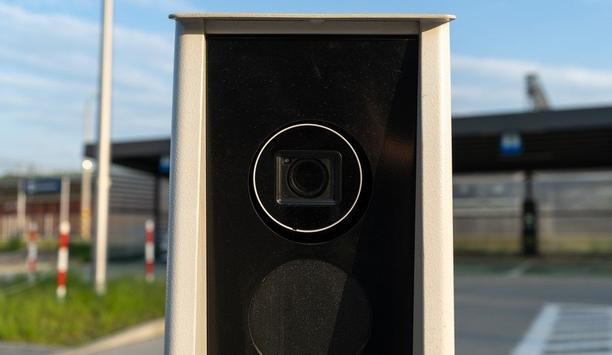Industrial security - Round table discussions
In many cases, architectural design and layout dictate optimal placement of security devices like cameras, access control readers, and sensors. Poor design can lead to blind spots, reduced coverage, and ineffective surveillance. However, planning that involves all the various stakeholders can maximise both security and design elements. We asked this week’s Expert Panel Roundtable: When are building design and physical security systems complementary? When are they at odds?
2024 was a year of significant challenges and remarkable progress in a world that is more interconnected than ever. Global collaboration continues to point the way toward continuing progress in multiple industries, including physical security. In 2024, technology continued to transform the way we connect and cooperate, driven by new technologies such as artificial intelligence (AI) and blockchain. We asked our Expert Panel Roundtable: How did the security marketplace “change for the better...
By all accounts, technology development is moving at a rapid pace in today's markets, including the physical security industry. However, market uptake of the newest technologies may lag, whether because of a lack of clear communication or not enough education of potential customers. We asked this week's Expert Panel Roundtable: How can the industry do a better job of promoting emerging technologies in physical security environments?
Retaining top talent is a route to bring innovative ideas and creative solutions to a company. Talent drives product development, improves processes, and helps businesses stay ahead of the competition. In essence, retaining top talent is essential for businesses to remain competitive, innovative, and successful. Unfortunately, staffing shortages are a reality for many corporate players in the security industry, as well as throughout the business community. We asked this week's Expert Panelists:...
The most common wearable device deployed by security professionals is the body-worn camera. Traditionally used by law enforcement professionals, these devices are finding more and more uses in the corporate security world, and even impacting issues such as customer service. However, the term “wearables” also encompasses a range of other devices, including many worn by consumers. We asked this week’s Expert Panel Roundtable: How are wearable technologies impacting the security m...
Audio might detect sounds like breaking glass or footsteps before a person even enters the field-of-view of a video camera. Audio also helps to provide context: Someone running in a video image might be suspicious, but the situation is different if they are yelling for help. Furthermore, audio enables operators to talk remotely to people on site, which can deter crime, de-escalate situations, or gather information. And yet, optimising audio is often an overlooked aspect of physical security syst...
Factors such as stable demand and large contracts make the government market particularly enticing for security companies and professionals. However, entering and thriving in the government market presents a number of challenges. We asked this week's Expert Panel Roundtable: What are the unique aspects of the government market, and how should the industry adapt?
There is safety in numbers, or so the expression goes. Generally speaking, several employees working together tend to be safer than a single employee working alone. Even so, some environments require that workers complete their jobs alone, thus presenting a unique combination of security vulnerabilities. The U.S. Occupational Safety and Health Administration (OSHA) defines a lone worker as “an employee working alone, such as in a confined space or isolated location.” We asked this we...
In the United States, they are called licence plate recognition (LPR) systems. In Europe, the more common term is automated licence number-plate recognition (ANPR). In either case, the systems provide capabilities that can benefit a range of applications from schools to municipalities to parking lots. Newer technologies can even identify vehicle colour, type, make and model. We asked this week’s Expert Panel Roundtable: What's new with licence plate recognition (LPR) and/or automated numbe...
Video storage has come a long way since rooms full of VCRs stored video from an entire system of cameras. Video storage equates to data storage, and there are multiple options ranging from hard disk storage to the cloud to storage on each individual camera using SD cards. Increasingly, cloud-based storage is an attractive option to store video footage conveniently and safely. We asked this week’s Expert Panel Roundtable: How is expansion of video storage capabilities impacting the security...
Headlines of violence in our schools are a reminder of the need to keep educational institutions safe. In fact, if there is a positive aspect to the constant bombardment of headlines, it is that it keeps our attention perpetually focused on how to improve school security. But what is the role of physical security systems? As the new school year begins, we asked this week’s Expert Panel Roundtable: Are schools safer because of physical security systems? Why or why not?
As physical security technologies become more complex, it is incumbent on the dealer/integrator to have the skills and expertise needed to ensure that a system operates smoothly. The value of integrators increasingly rests on the skill sets they bring to bear when installing a system. If the skills are missing, there is a problem. We asked this week’s Expert Panel Roundtable: What missing skills among security integrators can cause problems for customers?
Driving the smart homes market is the convenience of simple technology solutions. Almost every home now has a “smart speaker” that makes it easier than ever for homeowners to interface and control their technology. But where does security fit into the new landscape of smart home systems? We asked this week’s Expert Panel Roundtable: What’s new in smart homes and residential security systems?
Historically, the emphasis of security systems has been on reactivity, whether it’s providing video evidence of an incident or data to support a resulting investigation. Reactivity is core to impactful security, but increasingly, systems are also seeking to be more proactive. A proactive system seeks to prevent events from happening in the first place, thus mitigating the harm to an organisation, and making the need for a reactive response moot. We asked this week’s Expert Panel Roun...
The role of the integrator/installer in the physical security marketplace is shifting as technologies evolve and applications expand. Integrators are being faced with a need to augment their expertise both in a wider range of systems and deeper into the specifics of each increasingly complex technology. At the end of the day, it falls to the integrator/installer to ensure a system performs as promised, however much a consultant or even a manufacturer might be involved in the process. We asked th...
Deployed across a wide range of devices, the Internet of Things (IoT) collects data to help business owners make decisions on a macro scale as well as at a granular level. The IoT is a network of physical devices embedded with sensors, software, and network connectivity that allows them to collect and share data. We called on this week's Expert Panel Roundtable to comment on the intersection of the IoT and physical security. We asked: How is the Internet of Things (IoT) increasing the effectiven...
Analogue video cameras are still used in a variety of applications, primarily because yesterday’s robust and flexible technology is still functioning today, although it has been years, or even decades, since the initial installation. In many cases, this past generation of security cameras is still reliable and effective. Embracing an installed base of analogue cameras is often the most cost-effective approach when updating or expanding a surveillance system. But what about the futur...
Time flies in the busy world of security, so it’s no surprise that the midpoint of 2023 comes before know it. Let’s pause after the first half of the year to look ahead at what can expect during the second half (Hint: It’s all about AI). We asked this week’s Expert Panel Roundtable: What will likely be the most important technology development in the security marketplace in the second half of 2023?
As the first line of defence against unauthorised access to business premises, perimeter security can alert an enterprise of potential security threats while delaying or preventing any loss or damage due to criminal acts. Combining hardware and software, perimeter security addresses the outermost ring of a facility’s concentric circles of protection. Obviously, any threat addressed at the outermost edge of defence does not become a more immediate and urgent threat closer to a facility. We...
According to a report by the U.S. Government Accountability Office (GAO), artificial intelligence (AI) is expected to transform all sectors of society, including national security. The physical security marketplace is certainly feeling the impact of the new technology, which has quickly gained prominence as one of the industry’s most popular buzzwords. To assess the more practical aspects of the situation, we asked this week’s Expert Panel Roundtable: How is artificial intelligence (...
Risk is a core concept in the practice of physical security. However, the risk is not always assessed effectively. Ideally, an organisation's appetite for risk guides its security strategy and action planning to the minutest detail, including buying decisions for security equipment and systems. We asked this week's Expert Panel Roundtable: How does the concept of risk influence buying decisions in the security market?
A sad irony in the physical security industry has been the lax attention paid historically to the cybersecurity elements of our industry’s systems. However, the picture has improved starkly in recent years as manufacturers have stepped up to meet the cybersecurity challenges and awareness of the issue has become much higher. We asked this week’s Expert Panel Roundtable: What's new in cybersecurity for physical security systems?
Integrators and installers are on the front line of creating most security systems. They are also usually the first point of contact if there is a problem with the system. In general practice, many end users deal with integrators and seldom if ever speak to the manufacturer. Should it be that way? We asked this week’s Expert Panel Roundtable: Why does a manufacturer need a direct relationship with an end user?
Protecting video involves many of the same strategies and protocols as those used to protect any other type of data. In the world of IP cameras and systems, video can be transmitted anywhere in the world to anyone who needs to see it. But what about access by outsiders who are not authorised to view the video? Or what if heaven forbid, the video is accessed by an unauthorised user who later posts it to YouTube? We asked this week’s Expert Panel Roundtable: What safeguards are in place...
Every security system is unique, of course. Specific to each installation are the problems the customer and the integrator may experience along their journey. However, given the installation of hundreds of physical security systems, there are commonalities that occur. We asked this week’s Expert Panel Roundtable: What are the major pain points when installing a physical security system?
Big Data is a persistent buzzword in the broader technology realm and in the physical security market. More every year, it seems we see a greater impact of the compilation of numerous data sources (Big Data) on our market. Smart leaders in the industry are looking at the vast opportunities that exist to leverage Big Data into greater intelligence and situational awareness. We asked this week’s Expert Panel Roundtable: What is the intersection of the security market and "big data?"
Biometrics is both a mature technology in the physical security world and an innovation perpetually on the cutting edge. Biometric technologies received a boost during the COVID pandemic when “touchless” became a buzzword with particular relevancy to the world of biometrics. Higher security needs, such as “two-factor authentication,” are also driving demand for biometric products. We asked this week’s Expert Panel Roundtable: What are the latest technology trends in...
The upcoming ISC West trade show in Las Vegas will offer innumerable networking and learning opportunities for attendees. Manufacturers will take the opportunity to promote their businesses and showcase products and services to a targeted audience. Best of all, the event will be "in person," an advantage we should never again take for granted. We asked this week's Expert Panel Roundtable: What big announcements do you expect at ISC West 2023?
The economic outlook for the year ahead is uncertain at best. Multiple lingering issues are in play, such as inflation, supply chain challenges, global instability, and a changing workforce. But to what extent does a shaky economy equate to a slowdown in the security market? We asked this week’s Expert Panel Roundtable: How does the wider economic climate impact the market for security products and services?
There’s always more to talk about in our Expert Panel Roundtable discussions, and we appreciate the variety of opinionated responses offered throughout the year. Looking back at 2022, we found several random and uncategorised Expert Panel responses that were not previously published. We have rescued these responses from our cutting-room floor and present them here in the interest of generating even more discussion.
The ultimate guide to mastering key control
DownloadUsing artificial intelligence (AI) to automate physical security systems
DownloadA modern guide to data loss prevention
Download7 proven solutions for law enforcement key control and asset management
DownloadThe truth behind 9 mobile access myths
Download


































